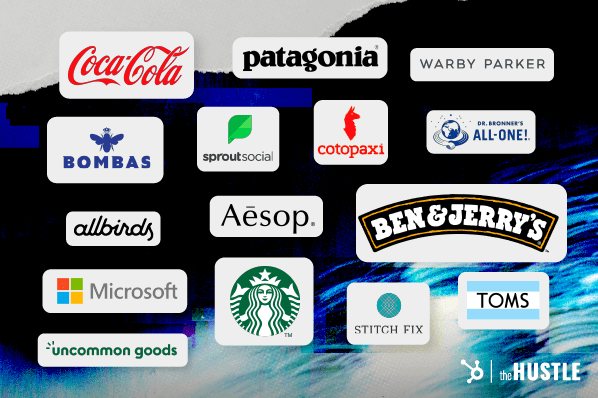In business, sustainability is all about finding better ways to do things. These methods generate profit today without sacrificing the well-being of a business’s future, the world, or the people in it.

Increasingly, governments, consumers, employees, and investors have all begun to see the value of building companies that can operate in a sustainable manner.
If you’re committed to running a great company and contributing to a better future, then sustainability reporting is how you can create accountability with yourself and your stakeholders.
What is sustainability reporting?
Sustainability reporting is a process that companies use to disclose their goals, progress, and impact on operating in an environmentally, socially, and economically sustainable way. In this context, sustainability refers to business operations that don’t negatively impact future generations.
In other words, this strategy focuses on the long-term impact of a business’s operations, rather than on earning short-term profits in exchange for engaging in environmentally, socially, or economically irresponsible practices.
Here’s a closer look at the different sustainability approaches and the goals businesses can work toward.
Sustainability reporting vs. ESG reporting
ESG refers to your company’s environmental, social, and governance impact, and can be considered a subset of sustainability. The major difference between the two concepts is that sustainability includes economic factors in its scope, while ESG includes issues related to corporate governance.
The governance criteria of ESG look at how you run your business in terms of ethics and responsibility toward stakeholders. When reporting on governance, you may look at transparency, risk management, fairness of compensation, stock structure, and how you handle customer data.
If you use corporate sustainability reporting, you may choose to pair an ESG report with information about how you’re creating economic longevity.
Benefits of sustainability reporting
Sustainability reporting isn’t just a trend. It’s a strategic tool that can help you build a better future for your company and community. Here are the benefits you get from sustainability reporting:
- Keep up with customer expectations: Sustainability is top of mind with consumers. One report found that 79% of consumers want to purchase environmentally sustainable products. However, most have trouble identifying which items meet their criteria. Sustainability reporting lets you tell customers which specific goals you're working toward and how your actions positively impact the environment and community.
- Improve talent acquisition and employee engagement: Highlighting your commitment to diversity, equity, and inclusion makes you a more attractive employer. It helps you attract top talent and keep employees engaged.
- Ensure compliance: The process of sustainability reporting can help you stay up to date and comply with labor laws and environmental regulations.
- Enhance risk mitigation: Sustainability reporting requires you to assess your operations and consider long-term feasibility. This forces you to think about potential risks to your business, which provides you with insight you can use to plan for and mitigate those challenges to create resilience in your business.
- Create cost-efficiency: Eliminating waste in your processes can help you operate more efficiently and identify opportunities to cut unnecessary costs.
- Improve your reputation: By committing to sustainability goals and tracking your impact, you create more trust with consumers, employees, and stakeholders. You position your company as a brand that cares about its people and its impact on the world.
- Attract potential investors: Attracting customers, retaining talent, managing risks, and ensuring compliance all come together to help position your company as a solid investment.
Sustainability reporting frameworks and standards
Sustainability reports don’t have strict or rigid requirements. However, using an existing framework or set of standards can streamline the process by narrowing down what type of information to include in your report.
Here are a few common options you can use:
Global Reporting Initiative (GRI)
The Global Reporting Initiative (GRI) is one of the most widely used standards. It creates a standardized approach to sustainability reporting for both small businesses and large companies. It includes three sets of standards: universal, sector, and topic.
You can customize your GRI standards report by choosing the sector and topics most relevant to your business.
Mobile app development company TechAhead uses the GRI standards because of their universal recognition. CEO Vikas Kaushik says, “It allows us to measure and report our sustainability performance in a way that’s comparable across industries and regions.”
Best standards for: Companies who want comprehensive sustainability reporting.
Task Force on Climate-Related Financial Disclosures (TCFD)
The Task Force on Climate-Related Financial Disclosures (TCFD) has published a set of recommendations for companies on disclosing climate-related information to potential investors. This framework includes 11 disclosures grouped into four themes: metrics and targets, risk management, strategy, and governance.
Best framework for: Companies with a climate-focused sustainability strategy who are seeking investments.
CDP
CDP, previously known as the Carbon Disclosure Project, offers a global online disclosure system known as the Online Response System (ORS). It can help you complete sustainability disclosure requests from external stakeholders, like investors and customers. You can also use the ORS to benchmark across the following key areas: climate change, the supply chain, forests, and water security.
Best framework for: Responding to inquiries from investors and customers.
Sustainability Accounting Standards Board (SASB)
The Sustainability Accounting Standards Board (SASB) provides industry-specific sustainability reporting standards that focus on environmental and economic factors. Sustainability disclosure standards are available for 77 industries, with each one focusing on the most relevant issues for the sector.
Madison Testa, business development manager at marketing agency Digital Caterpillar, explains that her company uses SASB because it “aligns with our industry-specific standards and enables us to benchmark against our peers.”
Best standards for: Companies who want industry-specific sustainability benchmarks.
The good news is that you’re not limited to just one framework or set of standards. You can use multiple options together to help you establish goals, measure your performance, and communicate progress with key stakeholders, such as customers, shareholders, and potential investors.
Sustainability reporting best practices
Here are some best practices to follow so you can get the most out of your company’s sustainability strategy and reporting.
Identify the issues relevant to your company
Conduct a materiality assessment to help identify the most relevant sustainability issues for your company. A materiality assessment is a formal exercise where you find out which ESG and economic issues are the highest priorities for internal and external stakeholders.
Internal stakeholders are your leadership team, managers, and employees. External stakeholders can include industry regulators, significant customers, and nongovernmental organizations (NGOs). Collecting and analyzing responses from these groups lets you prioritize the most important sustainability goals for your company.
Set specific and science-based goals
After you identify and prioritize your sustainable development goals, set measurable targets for each one. Defining specific performance goals and setting a deadline gives you a clear objective to work toward and boosts your report’s credibility.
Beyond being measurable, your goals should be science based, which means they’re informed by the latest research. Science Based Targets is an excellent resource for setting impactful environmental sustainability objectives. The United Nations Foundation website is a great place to start working on your social impact goals.
Get buy-in from your team
Sustainability efforts require collaboration across your entire organization, even for reporting. Keep everyone at your business educated about your goals, tactics, and motivation for making these changes.
You can get buy-in from teams by adding sustainability goals to your company mission, including them in the employee handbook and training materials, and letting team members know how their work directly impacts the company’s goals.
Leverage sustainability data software
Once you have quantitative goals, you need to set up data collection systems that help you monitor and record your progress.
Using software specifically designed to track sustainability data can streamline this process and create more accurate reporting. Look for features like data visualizations that can help you put together clear and compelling reports for your stakeholders.
Be completely honest
Sustainability reports can help you build trust and credibility with your team, potential customers, and investors. As such, it’s crucial that your reports are fully transparent, which means disclosing your challenges along with your successes.
If you fall short of your goals, be honest about it and discuss how you plan to improve. This shows your commitment to sustainability and helps you maintain a trustworthy reputation.
Inform your stakeholders
Giving your stakeholders progress reports is an excellent way to continue building relationships based on trust and open communication. More frequent communication can help keep people engaged, especially internal team members who are responsible for helping you meet your goals.
Not to mention, celebrating milestones along the way creates a sense of pride around the work your team is doing.
Sustainability reporting helps you grow your business financially while also paving the way for future generations to thrive. You create accountability by defining clear goals, measuring your company’s performance, and calculating the impact of your sustainability strategy.
In return, you benefit from increased efficiency, lower risks, and a better reputation with your community, customers, and stakeholders.




.png)
.png)
